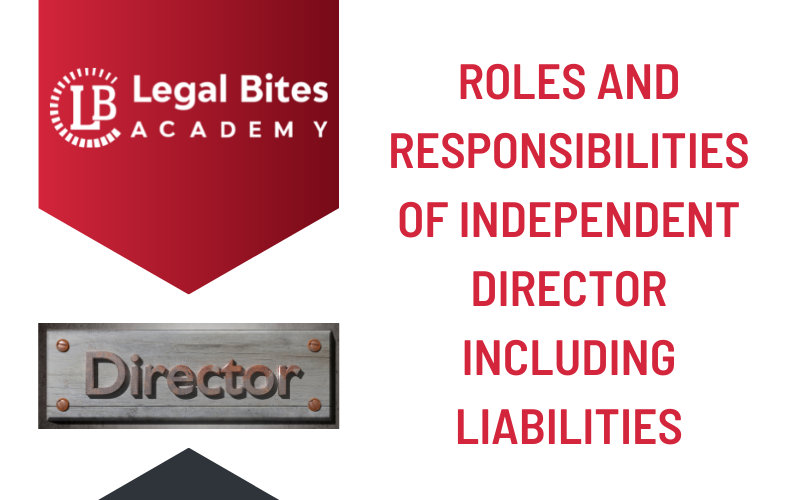Roles And Responsibilities Of Independent Director Including Liabilities
This article titled ‘Roles And Responsibilities Of Independent Director Including Liabilities’ is written by Mayank Shekhar and discusses the roles, responsibilities and liabilities of an independent director. I. Introduction The Companies Act, 2013 governs independent directors in India (“Act”). In the board of directors of any publicly traded firm, at least one-third of the total number of directors must… Read More »
;
This article titled ‘Roles And Responsibilities Of Independent Director Including Liabilities’ is written by Mayank Shekhar and discusses the roles, responsibilities and liabilities of an independent director.
I. Introduction
The Companies Act, 2013 governs independent directors in India (“Act”). In the board of directors of any publicly traded firm, at least one-third of the total number of directors must be independent directors1. Every unlisted public corporation that meets the following requirements must appoint at least two independent directors:
- A public corporation with a paid-up share capital of ten crore rupees or more; a public company with a revenue of one hundred crore rupees or more;
- or a public firm with outstanding loans, debentures, and deposits totalling more than fifty crore rupees.
The Act establishes criteria for independent directors who are selected in compliance with it. An independent director’s functions and obligations are also defined under the Act:
(a) An independent director is required to attend the company’s first board meeting and every first board meeting thereafter for each financial year;
(b) An independent director is required to attend board meetings called at shorter notice, and if the independent director is unable to attend the board meeting called at shorter notice, the decision made at such meetings shall be final only upon ratification by an independent director.
(c) An independent director must give a statement establishing his or her independence at the first board meeting in which he or she participates as a director after being appointed.
Following that, the independent director must produce such a statement every financial year or if changes to his or her position as an independent director occur.
The independent directors must follow the Code of Independent Directors in addition to the Act’s obligations. The Code of Independent Directors establishes the essential rules that independent directors must follow throughout their term of office.
While the aforementioned legislation is prescriptive in nature, it does set out the following responsibilities for an independent director:
(a) To complete necessary induction and to routinely update and refresh their skills, knowledge, and familiarity with the firm;
(b) To make every effort to attend all meetings of the Board of Directors and the Board Committees to which he or she is a member.
(c) To stay informed about the company and the external environment in which it operates;
(d) To ensure that adequate deliberations are held before approving related party transactions and that the transactions are in the company’s best interests;
(e) To report concerns about unethical behaviour, actual or suspected fraud of the company’s code of conduct or ethics policy;
(f) Not to disclose confidential information such as commercial secrets, technologies, or a company’s code of conduct or ethics policy;
(g) participate constructively and actively in the Board committees in which they are chairpersons or members;
(h) where they have concerns about the company’s operations or a proposed action, ensure that these are addressed by the Board and, to the extent that they can, participate constructively and actively in the Board committees in which they are chairpersons or members.
II. Liabilities of an Independent Director
The activities and obligations done by an independent director during his or her appointment might be used to determine his or her culpability. A director’s culpability is determined by the circumstances in which he or she takes action.
The court found that the process of finding culpability cannot be done mechanically without paying attention to the circumstances of the case and the provision of the law in a case where the court interpreted the meaning of an officer in default.’
In a case where a loan was disbursed without approval, the court had to decide whether a director who signed the company’s balance statement may be deemed to have knowledge of the loan distribution and that the disbursement was without approval. The court decided that since the aforementioned director was a practising lawyer and solicitor, he could only serve as a non-executive director. As a result, a main or active director’s obligation cannot be assigned to him.
III. Impact of Companies (Amendment) Act, 2019 on Independent Directors
On July 31, 2019, the Companies (Amendment) Act, 2019 (the “Amendment Act”) went into force. The Companies (Amendment) Ordinance, 2018, the Companies (Amendment) Ordinance, 2019, and the Companies (Amendment) Second Ordinance, 2019 all made amendments to the Act.
The Amendment Act made changes to Section 212. It is concerned with the severe fraud investigation office’s examination of the Company’s operations.
The Amendment Act provides that if any director, key managerial personnel, other officers of the company, or any other person or entity has taken an undue advantage, whether in the form of any asset, property, or cash, or in any other manner, the Central Government may file an application before the Tribunal or appropriate orders with regard to disgorgement of such asset, property, or cash, as well as holding such director, key managerial personnel, other officers of the company, or any other person or entity, the Central Government may file an application before
This addition has enlarged the reach of Section 212, attempting to put any individual (even an independent director) under its jurisdiction.
IV. How can Legal Bites help?
LegalBites provides end-to-end secretarial services. We can help you register as an independent director in the MCA website for the company and fill all the forms. We can also assist you with yearly Directors KYC requirements.
For more, you can contact us at contact@legalbites.in

